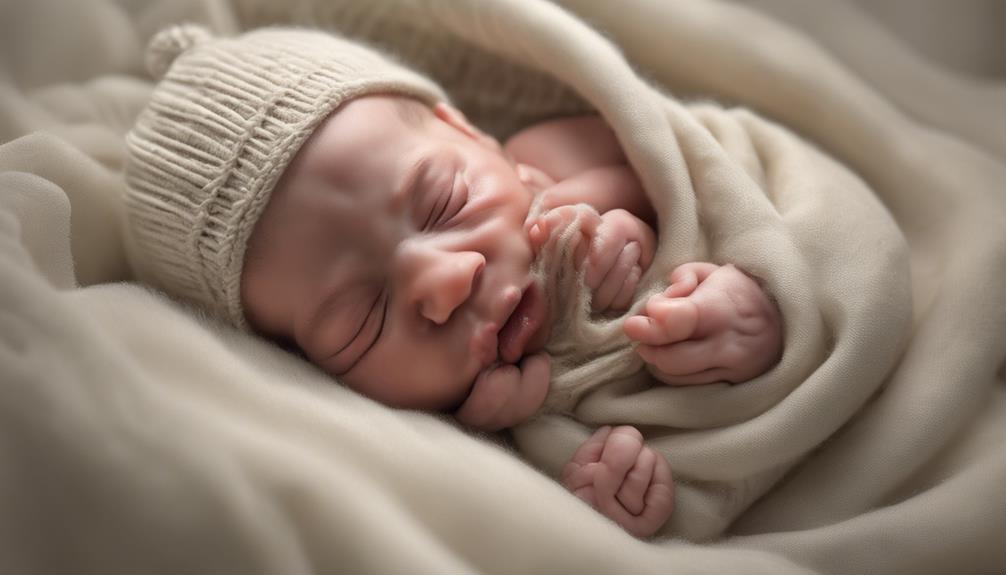When dealing with newborns and their sleep patterns, the peacefulness of sleep can be disturbed by unexpected noises.
Ever wondered why those tiny beings might gag during their peaceful rest? Well, here's a hint: the answer could lie in their delicate airways and developing reflexes.
But, hang on for a moment, as we unravel seven intriguing reasons behind this phenomenon that might surprise you and shed light on ways to guarantee your little one's comfort during those tender slumbering hours.
Key Takeaways
- Acid reflux, immature swallowing reflexes, nasal congestion, and sleep position contribute to newborn gagging during sleep.
- Safe sleep practices, monitoring excessive saliva, addressing respiratory infections, and managing teething discomfort can help reduce gagging incidents.
- Back sleeping decreases SIDS risk, while side sleeping poses suffocation risks; safe sleep practices are crucial for newborn well-being.
- Prevent respiratory infections by maintaining hygiene, seeking medical advice, and avoiding smoke exposure to minimize newborn gagging during sleep.
Acid Reflux
When newborns experience acid reflux, their delicate systems can be disrupted, leading to episodes of gagging during sleep. This occurs when stomach contents flow back up into the esophagus and throat, triggering a reflex that can cause discomfort and distress. Gagging from acid reflux is often accompanied by symptoms like spitting up, coughing, and irritability. Newborns may also show signs of arching their back, experiencing feeding difficulties, and overall restlessness.
It is essential to note that acid reflux can worsen when babies lie flat, exacerbating the frequency of gagging episodes during sleep. This can be distressing for both the infant and the caregivers. Treatment for acid reflux in newborns may involve a combination of medications, dietary adjustments, and specific positioning techniques to help alleviate the symptoms. By addressing the underlying causes and managing the condition effectively, it's possible to reduce the discomfort associated with acid reflux and improve the overall well-being of the newborn.
Immature Swallowing Reflexes

Newborns may experience gagging during sleep as a result of their immature swallowing reflexes, which are still developing in the early stages of life. Immature swallowing reflexes can lead to occasional gagging episodes as newborns navigate the complex coordination of sucking, swallowing, and breathing. It is common for newborns to gag during sleep as their central nervous system continues to mature. The immaturity of their swallowing reflexes contributes to these temporary challenges. Thankfully, as newborns grow and their neurological development progresses, their ability to swallow more effectively improves, and the instances of gagging tend to decrease. Understanding that immature swallowing reflexes play a significant role in newborns' gagging episodes can provide reassurance to parents and caregivers who may be concerned about these occurrences.
| Immature Swallowing Reflexes |
|---|
| Development in early life |
| Coordination challenges |
| Common in newborns |
Nasal Congestion
Experiencing nasal congestion can disrupt a newborn's peaceful sleep, making breathing more challenging. Nasal congestion in newborns is a common issue that can lead to difficulty breathing, especially during sleep when babies primarily breathe through their noses. This congestion can be caused by factors such as mucus buildup, allergies, or a common cold. When a newborn is congested, they may struggle to breathe comfortably, leading to disruptions in their sleep patterns.
To help alleviate nasal congestion in newborns and improve their breathing during sleep, there are a few strategies that can be employed. Using saline drops and a bulb syringe can help clear out the nasal passages, allowing for easier breathing. Additionally, elevating the baby's head slightly while they sleep can aid in reducing nasal congestion and promoting better airflow.
It is important to address nasal congestion in newborns promptly to ensure they can breathe comfortably and get the rest they need for healthy development. By implementing these strategies, parents can help their newborns overcome nasal congestion and improve their quality of sleep.
Sleep Position
When it comes to newborns' sleep positions, we need to be mindful of the risks associated with side sleeping and the benefits of back sleeping. Placing babies on their backs reduces the chances of choking or aspiration during sleep, providing a safer environment overall.
It's important to follow guidelines that prioritize back sleeping to guarantee our little ones sleep soundly and securely.
Side Sleeping Risks
While side sleeping may seem comforting, it poses significant risks to newborns' safety during sleep, including an increased likelihood of Sudden Infant Death Syndrome (SIDS). The American Academy of Pediatrics (AAP) advises against side sleeping due to the dangers it presents to infants. Babies placed on their side might roll onto their stomach, increasing the risk of suffocation. Additionally, side sleeping can compress a baby's airway, leading to breathing difficulties and higher chances of choking incidents. To guarantee the safety of newborns during sleep, it is vital to follow the AAP's recommendation of placing babies on their back to reduce the risk of sleep-related infant deaths.
| Risk of Side Sleeping |
|---|
| Increased SIDS risk |
| Suffocation hazard |
| Airway compression |
| Breathing difficulties |
| Choking incidents |
Back Sleep Benefits
Promoting safer sleep practices for newborns, back sleeping offers essential benefits in reducing the risk of Sudden Infant Death Syndrome (SIDS) and ensuring ideal airflow and breathing alignment during rest.
- Back sleeping reduces the risk of SIDS by providing a safer sleep position for newborns.
- This sleep position promotes better airflow, reduces overheating, and aligns the airway for easier breathing during sleep.
- Babies sleeping on their back are less likely to choke on vomit or fluids, minimizing choking hazards.
Choosing back sleeping for infants not only decreases the chances of aspiration but also creates a safer sleeping environment overall. Remember, a firm mattress and following safe sleep guidelines can greatly lower the risk of choking incidents during your baby's sleep.
Excessive Saliva Production
Excessive saliva production in newborns can contribute to episodes of gagging during sleep, posing potential challenges for both the baby and caregivers. This excess saliva, while aiding in digestion, can sometimes lead to temporary issues such as gagging, especially during sleep when swallowing reflexes may not be as active. Babies naturally produce more saliva than adults, increasing the likelihood of gagging incidents. Factors like teething or swallowing difficulties can further exacerbate this situation, making it important for caregivers to be vigilant.
To manage excessive saliva-related gagging, simple steps can be taken. Keeping the baby's head slightly elevated during sleep can help prevent the pooling of saliva in the mouth, reducing the chances of gagging. Additionally, monitoring the baby's sleep position can also play a significant role in managing this issue. By staying attentive to these details, caregivers can help alleviate the discomfort and potential distress that excessive saliva production may cause for newborns.
Respiratory Infections

As we discuss respiratory infections in newborns, it's crucial to understand that illnesses like colds and flu can trigger gagging during sleep. These infections often lead to symptoms such as nasal congestion and increased mucus production, which may cause difficulty breathing and noisy breathing patterns.
Keeping newborns in a clean environment and seeking proper medical advice can help prevent and manage these respiratory issues effectively.
Common Causes: Respiratory Infections
Respiratory infections such as colds, flu, and bronchiolitis can trigger newborns to gag during sleep due to congestion and mucus buildup affecting their breathing. When newborns are battling respiratory infections, they may experience discomfort and struggle to breathe properly, leading to gagging episodes.
Here are some key points to take into account:
- The presence of congestion and mucus can obstruct the airways, making it harder for newborns to breathe normally.
- Gagging, coughing, or choking sounds are common signs that newborns are trying to clear their airways of excess mucus.
- Seeking prompt medical attention and following treatment recommendations can help alleviate symptoms and reduce gagging incidents.
Prevention Tips: Keep Clean
Regularly cleaning and disinfecting your baby's toys, pacifiers, and feeding equipment is important to prevent the spread of respiratory infections. Gagging during sleep can be triggered by respiratory issues, so maintaining cleanliness is vital. Remember to wash your hands thoroughly before handling your little one to minimize germ transmission, reducing the risk of respiratory infections.
It's also wise to keep your baby away from sick individuals who could pass on respiratory viruses and bacteria. Good ventilation in your home is key to ensuring clean air and lowering the chances of respiratory problems. Additionally, steer clear of exposing your baby to cigarette smoke, as it heightens the likelihood of respiratory issues.
Teething Discomfort

Teething discomfort in newborns often leads to increased saliva production, which can result in gagging episodes during sleep. This natural process can be unsettling for both babies and caregivers. When teething discomfort causes babies to produce more saliva, they may struggle to swallow efficiently, leading to gagging incidents during their sleep.
Here are some helpful tips to navigate this phase:
- Offer teething toys: Providing safe teething toys can give babies something soothing to chew on, helping relieve gum discomfort and reducing excessive saliva production.
- Gentle gum massages: Massaging the baby's gums with clean fingers or a soft, damp cloth can offer relief from teething pain and may decrease the likelihood of gagging during sleep.
- Keep a clean environment: To prevent any potential choking hazards from saliva or teething toys, make certain the sleeping area is clear and safe for the baby to rest comfortably.
Understanding and addressing teething discomfort can help manage gagging episodes during sleep, making the experience more comfortable for your little one.
Frequently Asked Questions
Is It Normal for Newborns to Randomly Gag?
Yes, it's normal for newborns to randomly gag during sleep. It's often due to residual lung fluid or passage issues. As parents, we should monitor these episodes. Gagging typically resolves as the baby's respiratory system matures.
Why Do Newborns Choke While Sleeping?
First off, newborns may choke while sleeping due to residual fluid in their airways. It's a normal part of their respiratory development as they clear fluid from their lungs. Understanding this process can ease parental worries.
What Does Gagging Mean Newborn?
Gagging in newborns during sleep can be a normal developmental process. It may indicate the need to clear lung fluid. Monitoring these episodes helps understand their respiratory health. Observing and reacting appropriately is essential for their well-being.
How Do I Stop My Newborn From Gagging?
Let's help your newborn sleep soundly. Elevate their head slightly, avoid overfeeding, and keep their sleep space safe. Stay vigilant for any signs of distress. Consult with your healthcare provider for personalized guidance.
Are Gagging and Grunting Signs of a Common Newborn Sleep Issue?
Many parents wonder why newborns grunt in their sleep. Gagging and grunting during sleep is usually harmless and common in newborns. It can be a sign of immature airways or a developing digestive system. However, if you have concerns about your baby’s breathing or sleeping patterns, consult a pediatrician for reassurance.
Conclusion
To sum up, newborns may gag during sleep due to various reasons like acid reflux, immature swallowing reflexes, and teething discomfort. It's important for parents to understand these factors and seek medical advice if needed.
For example, Sarah noticed her baby gagging during sleep and after consulting with her pediatrician, discovered it was due to nasal congestion. By addressing the underlying cause, Sarah was able to help her baby sleep more comfortably.









